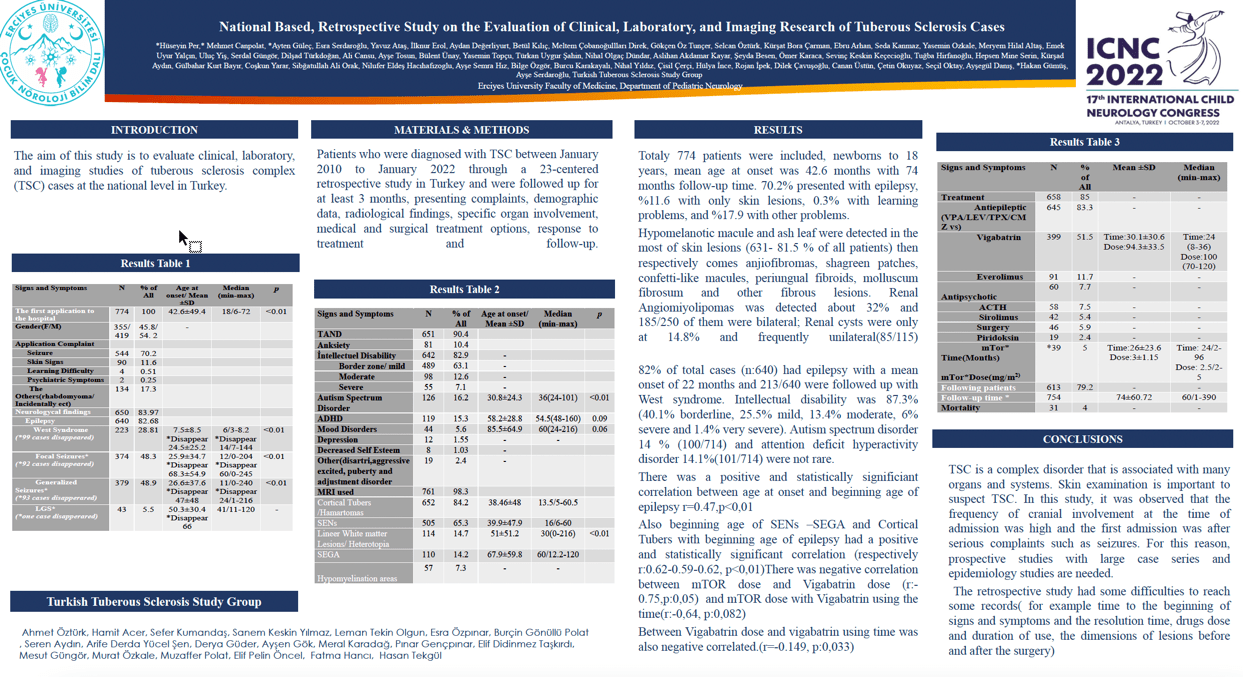National Based, Retrospective Study on the Evaluation of Clinical, Laboratory, and Imaging Research of Tuberous Sclerosis Cases
Hüseyin Per, Mehmet Canpolat, Ayten Güleç, Esra Serdaroğlu, Yavuz Ataş, İlknur Erol, Aydan Değerliyurt, Betül Kılıç, Meltem Çobanoğullları Direk, Gökçen Öz Tunçer, Selcan Öztürk, Kürşat Bora Çarman, Ebru Arhan, Seda Kanmaz, Yasemin Ozkale, Meryem Hilal Altaş, Emek Uyur Yalçın, Uluç Yiş, Serdal Güngör, Dilşad Türkdoğan, Ali Cansu, Bülent Ünay, Yasemin Topçu, Türkan Uygur Şahin, Nihal Olgaç Dündar, Aslihan Akdamar Kayar, Şeyda Besen, Ömer Karaca, Sevinç Keskin Keçecioğlu, Tuğba Hirfanoğlu, Hepsen Mine Serin, Kürşad Aydın, Gülbahar Kurt Bayır, Coşkun Yarar, Sibğatullah Ali Orak, Nilufer Eldeş Hacıhafızoglu, Ayşe Semra Hız, Bilge Özgör, Burcu Karakayalı, Nihal Yıldız, Çisil Çerçi, Hülya İnce, Rojan İpek, Dilek Çavuşoğlu, Canan Üstün, Çetin Okuyaz, Ayşegül Danış, Hakan Gümüş, Ayşe Serdaroğlu, Turkish Tuberous Sclerosis Study Group
Objectives: The aim of this study is to evaluate clinical, laboratory, and Imaging studies of tuberous sclerosis complex (TSC) cases at the national level in Turkey. Methods: Patients who were diagnosed with TSC between January 2010 to January 2022 through a 23 centered retrospective study in Turkey and were followed up for at least 3 months, presenting complaints, demographic data, radiological findings, specific organ involvement, medical and surgical treatment options, response to treatment and follow-up. Results: Totaly 714 patients, newborn to 18 years, mean age at onset was 44,4 months with 71.4 months follow-up time. 70% were presented with epilepsy, %11.6 with only skin lesions, 0,3% with learning problems, and %18.2 with other problems. 82% of total cases (n:586) had epilepsy with a mean onset of 22.6 months and 195/586 were followed up with West syndrome. Intellectual disability was 87,3% (40.1% borderline, 25.5% mild, 13.4% moderate, 6% severe and 1.4% very severe). Autism spectrum disorder 14 % (100/714) and attention deficit hyperactivity disorder 14.1%(101/714) were not rare. Conclusion: TSC is a complex disorder that is associated with many organs and systems. In this study, the frequency of cranial involvement at the time of admission was high. We observed that in the absence of serious acute complaints such as seizures, the first admission age was older. Neurophysiologic markers are needed to define epileptogenesis for early antiepileptogenic therapies.
Keywords: tuberous sclerosis, epilepsy, child
Hüseyin Per
Mehmet Canpolat
Erciyes University Faculty of Medicine, Department of Pediatric Neurology
Ayten Güleç
Erciyes University Faculty of Medicine, Department of Pediatric Neurology
Esra Serdaroğlu
Gazi University Faculty of Medicine, Department of Pediatric Neurology
Yavuz Ataş
Ege University Faculty of Medicine, Department of Pediatric Neurology
İlknur Erol
Baskent University Adana Turgut Noyan Hospital, Department of Pediatric Neurology
Aydan Değerliyurt
Ankara City Hospital, Department of Pediatric Neurology
Betül Kılıç
Medipol University Faculty of Medicine, Department of Pediatric Neurology
Meltem Çobanoğullları Direk
Mersin University Faculty of Medicine, Department of Pediatric Neurology
Gökçen Öz Tunçer
Ondokuz Mayıs University Faculty of Medicine, Department of Pediatric Neurology
Selcan Öztürk
Objectives: The aim of this study is to evaluate clinical, laboratory, and Imaging studies of tuberous sclerosis complex (TSC) cases at the national level in Turkey. Methods: Patients who were diagnosed with TSC between January 2010 to January 2022 through a 23 centered retrospective study in Turkey and were followed up for at least 3 months, presenting complaints, demographic data, radiological findings, specific organ involvement, medical and surgical treatment options, response to treatment and follow-up. Results: Totaly 714 patients, newborn to 18 years, mean age at onset was 44,4 months with 71.4 months follow-up time. 70% were presented with epilepsy, %11.6 with only skin lesions, 0,3% with learning problems, and %18.2 with other problems. 82% of total cases (n:586) had epilepsy with a mean onset of 22.6 months and 195/586 were followed up with West syndrome. Intellectual disability was 87,3% (40.1% borderline, 25.5% mild, 13.4% moderate, 6% severe and 1.4% very severe). Autism spectrum disorder 14 % (100/714) and attention deficit hyperactivity disorder 14.1%(101/714) were not rare. Conclusion: TSC is a complex disorder that is associated with many organs and systems. In this study, the frequency of cranial involvement at the time of admission was high. We observed that in the absence of serious acute complaints such as seizures, the first admission age was older. Neurophysiologic markers are needed to define epileptogenesis for early antiepileptogenic therapies.
Keywords: tuberous sclerosis, epilepsy, child
Hüseyin Per
Mehmet Canpolat
Erciyes University Faculty of Medicine, Department of Pediatric Neurology
Ayten Güleç
Erciyes University Faculty of Medicine, Department of Pediatric Neurology
Esra Serdaroğlu
Gazi University Faculty of Medicine, Department of Pediatric Neurology
Yavuz Ataş
Ege University Faculty of Medicine, Department of Pediatric Neurology
İlknur Erol
Baskent University Adana Turgut Noyan Hospital, Department of Pediatric Neurology
Aydan Değerliyurt
Ankara City Hospital, Department of Pediatric Neurology
Betül Kılıç
Medipol University Faculty of Medicine, Department of Pediatric Neurology
Meltem Çobanoğullları Direk
Mersin University Faculty of Medicine, Department of Pediatric Neurology
Gökçen Öz Tunçer
Ondokuz Mayıs University Faculty of Medicine, Department of Pediatric Neurology
Selcan Öztürk

Ayten Güleç
Erciyes University Faculty of Medicine, Department of Pediatric Neurology
Erciyes University Faculty of Medicine, Department of Pediatric Neurology